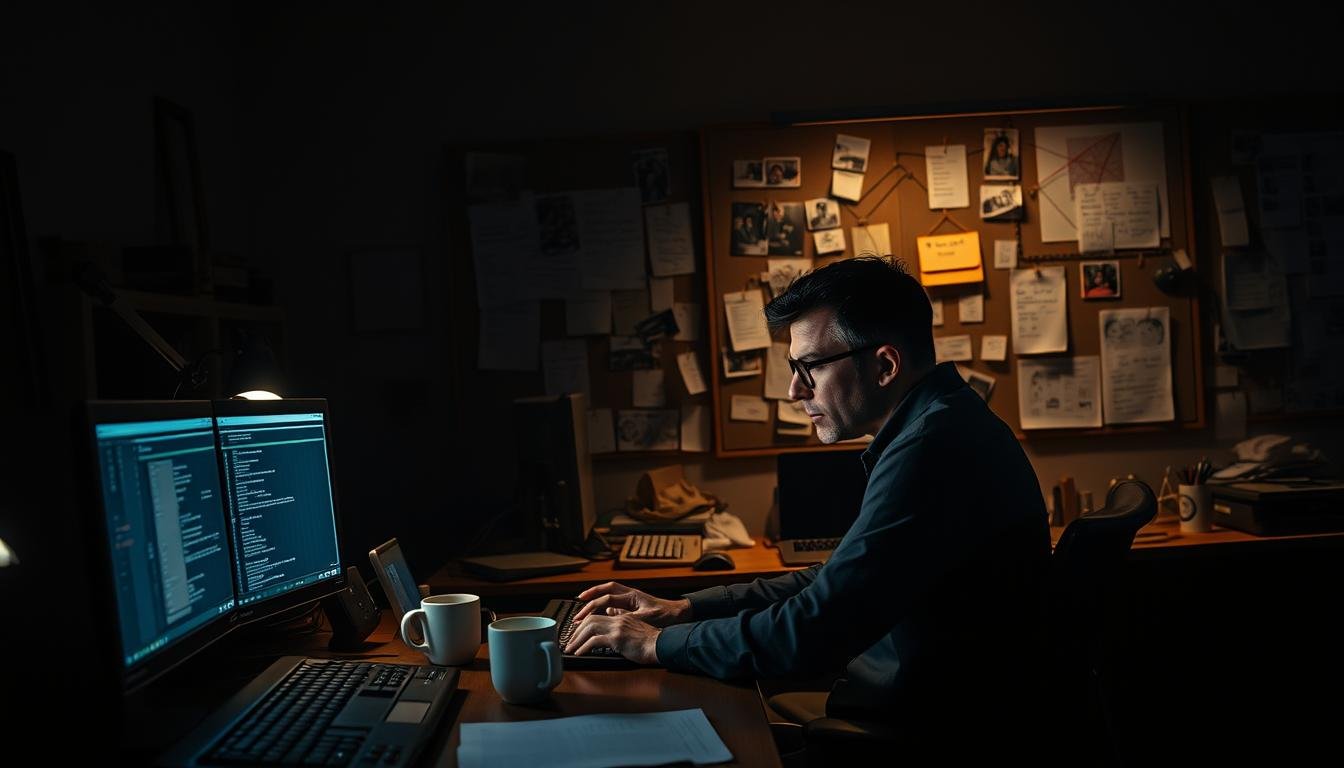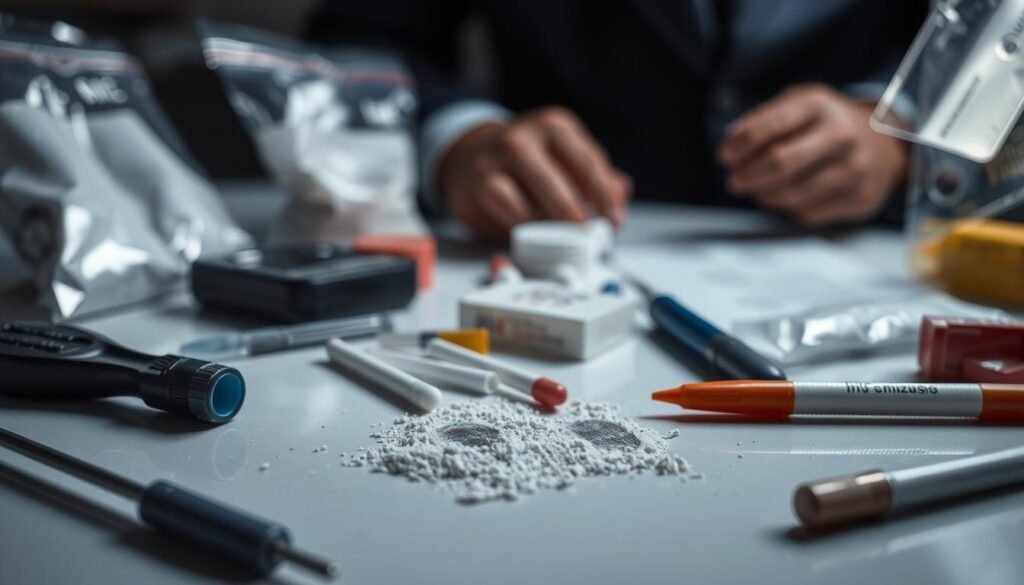
A recent survey showed that 70% of true crime fans think using “internet sleuths” to solve crimes is a good idea. Only 8% disagree. This big difference shows how popular online detectives are becoming. It also shows we need to know the difference between amateur sleuths and real detectives.
The rise of true crime media has made more people want to solve crimes online. This can be good, like getting more people involved and getting more information. But it can also be bad, like spreading false information and messing with official investigations.
Key Takeaways
- The majority of true crime fans support the use of online detectives.
- There’s a significant difference between amateur sleuthing and professional investigations.
- The rise of true crime media has fueled the growth of internet sleuthing.
- Online investigations can provide crowdsourced information but also risk spreading misinformation.
- Understanding the limitations of internet sleuthing is key.
The Rise of Internet Sleuthing in the Digital Age
True crime content has become very popular, leading to more people doing internet sleuthing. This is because of the easy access to digital information and the growing interest in true crime stories. It has changed how we follow criminal investigations, moving from old-school detective work to a new digital world.

From Armchair Detectives to Digital Investigators
Internet sleuthing started from the old days of armchair detectives. They used to guess and look into crimes with little help. But now, thanks to the digital age, sleuths have many tools and information right at their fingertips.
Key factors driving this evolution include:
- The spread of social media and online forums
- New digital tech and data analysis
- Easier access to public records and databases
The Impact of True Crime Media on Amateur Investigations
True crime media has really helped make internet sleuthing popular. Shows, podcasts, and books have not only drawn in viewers but also encouraged people to join in on investigations.
A 2022 YouGov poll found that half of Americans enjoy true crime stories. This has led to more online communities focused on true crime. People there share tips and work together on cases.
| True Crime Media Format | Percentage of Consumers |
|---|---|
| Documentaries | 42% |
| Podcasts | 31% |
| Books | 27% |
Notable Cases Where Online Detectives Made a Difference
There are many cases where online sleuths helped solve crimes. They’ve looked at digital clues, found suspects, and given tips to police.
Notable examples include:
- The Golden State Killer case was solved thanks to genetic genealogy
- The Boston Marathon bombing was investigated by a crowd, showing the power of teamwork
Understanding Professional Investigative Methodology
Good investigations need a solid grasp of science and law. Investigators must use many methods and follow strict rules. This makes sure their results are trustworthy and useful.

The Scientific Method in Criminal Investigations
The scientific method is key in solving crimes. It helps investigators collect and study evidence carefully. They start with observations, then test their ideas to learn more.
Important steps include observing, making guesses, predicting, testing, and drawing conclusions. Each step is vital for a strong investigation that can stand up to questions.
Chain of Custody and Evidence Handling
Keeping the chain of custody right is very important. It means tracking every step of evidence handling to keep it safe. Investigators follow strict rules to keep evidence clean and ready for court.
- Proper labeling and storage of evidence
- Detailed documentation of evidence handling
- Secure storage facilities
Legal Standards for Evidence Collection
Collecting evidence must follow strict legal rules. Investigators need to know these rules well. This helps keep the evidence and the investigation strong.
By following these rules, investigators make sure their evidence can be used in court. This helps build a strong case and supports justice.
The Tools of Internet Sleuthing: Digital Resources and Limitations
Internet sleuthing has grown, thanks to new tools like social media monitoring and public records access. These tools help amateur investigators solve cases. They can now contribute to investigations in meaningful ways.
Social Media as an Investigative Platform
Social media is key for sleuths. It’s full of public info that helps solve crimes or find missing people. For example, Facebook, Twitter, and Instagram can:
- Find witnesses
- Track suspects
- Find clues in posts and photos
But, it’s important to check if the info is real to avoid spreading false news.

Public Records and Database Access
Public records and databases are also vital for sleuths. They include:
| Record Type | Description | Potential Use |
|---|---|---|
| Criminal Records | Details of past convictions | Identifying repeat offenders |
| Property Records | Ownership and transaction history | Tracing financial links |
| Missing Persons Records | Details of missing individuals | Aiding in the search for missing persons |
These records help a lot in investigations. But, sleuths must know the laws and privacy rules.
Image and Video Analysis Techniques
Advanced software for image and video analysis is a big help for sleuths. They can:
- Make blurry footage clearer
- Check metadata
- Compare images
But, how good these methods are depends on the quality of the footage and the analyst’s skill.
Limitations of Digital-Only Investigation
Even with digital tools, there are big limits to just using digital methods. These include:
- Chances of false info
- No physical evidence
- Hard to know if digital data is real
So, digital methods are useful but should be used with old-school methods too.
Professional Investigation Tools and Techniques
Today, investigators use many methods, from digital forensics to collecting physical evidence. The success of an investigation depends on using both old and new techniques.
Digital Forensics: Beyond What’s Visible Online
Digital forensics helps find and analyze data from digital devices. It’s key for investigations. This work looks deeper than just online actions, finding deleted files and tracking user activities.
Key aspects of digital forensics include finding data, breaking encryption, and looking at network traffic. Investigators use special software to keep evidence safe and usable in court.
Physical Evidence Collection and Analysis
Physical evidence is vital in investigations. It connects suspects, victims, and crime scenes. Collecting and analyzing this evidence needs careful attention and strict rules to avoid contamination.
Methods like fingerprint analysis, DNA testing, and ballistics are important. They help piece together what happened during a crime.
Interview and Interrogation Techniques
Interviewing and interrogating is complex, needing to understand human psychology. Good investigators use various methods to get information, from making connections to strategic questioning.
Key strategies include listening well, noticing body language, and asking questions based on evidence. The aim is to get accurate info while staying ethical and legal.
Surveillance Methods and Legal Boundaries
Surveillance is a strong tool for investigation, allowing real-time evidence gathering. But, it’s limited by laws to protect privacy and prevent misuse.
Investigators must follow these laws closely, getting the right warrants and sticking to surveillance rules. This makes sure the evidence is both useful and can be used in court.
The Legal Framework: What Citizen Investigators Need to Know
Knowing the legal rules is key for safe internet sleuthing. As they dig into digital cases, they need to know the laws that guide them. This knowledge helps them avoid trouble and make their work useful.
Privacy Laws and Online Investigations
When doing online sleuthing, privacy laws are important. Privacy laws differ by place, but they all aim to protect personal info. Sleuths must be careful not to break these laws when they gather and share info.
In the U.S., the Electronic Communications Privacy Act (ECPA) controls electronic messages. The General Data Protection Regulation (GDPR) in the EU also has strict rules for personal data. Knowing these laws helps sleuths stay out of trouble.
Defamation and False Accusations
Another big risk is defamation or making false claims. Sleuths must make sure their online posts are true and not misleading. False claims can lead to big legal problems, like defamation lawsuits.
To avoid these issues, sleuths should check facts from different sources before posting. They should also be careful with their words to avoid damaging someone’s reputation.
Interfering with Official Investigations
Sleuths also need to watch out for interfering with official investigations. Even if they mean to help, their actions can sometimes get in the way. This can happen if they spread false info, mess with evidence, or block the investigation.
To not get in the way, sleuths should follow official updates and advice from law enforcement. They should not share unconfirmed info and avoid actions that could block the investigation.
International Considerations in Digital Sleuthing
The internet is global, so international laws matter a lot in sleuthing. Sleuths might accidentally break laws in other countries, leading to legal trouble.
It’s important for sleuths to know the legal effects of their actions worldwide. This includes understanding privacy, defamation, and other laws that might apply to their online work.
Ethical Considerations in Amateur Investigations
Internet sleuthing can be helpful but also raises big ethical questions. As amateur detectives dig into cases, they must think about how their actions affect the investigation, victims, and their families.
The “Do No Harm” Principle
A key ethical rule for internet sleuths is the “do no harm” principle. This means they should not do anything that could mess up official investigations or upset those affected by a crime. For example, sharing unconfirmed info or guesses can be harmful. It’s important for amateur detectives to check facts from different sources before posting them online.
- Be careful with the info you share online.
- Stay away from speculation that could confuse the public or investigators.
- Think about the possible effects of your actions.
Respecting Victims and Their Families
Another big ethical issue is treating victims and their families with respect. Internet sleuths need to remember the sensitive nature of the info they deal with. They should be careful about what they post on social media and other public places.
- Respect privacy and personal info.
- Don’t make crimes seem exciting or important.
- Think about how your actions might affect families and loved ones.
When to Step Back and Contact Authorities
Knowing when to stop and call in the pros is a big ethical choice for internet sleuths. If you find important or sensitive info, it’s best to share it with the right authorities instead of keeping digging. This keeps the investigation honest and follows the law.
By following these ethical rules, internet sleuths can help investigations without causing harm. It’s a tricky balance that needs careful thought and a thoughtful approach.
Internet Sleuthing: A Step-by-Step Guide to Responsible Practice
Online investigations are becoming more common. It’s important to know how to do them right. We’ll look at the steps for thorough and ethical online detective work.
Establishing Clear Objectives and Boundaries
Before starting an online investigation, set clear goals and limits. This means:
- Knowing why you’re doing the investigation
- Deciding what to research
- Figuring out how to judge the information
Having clear goals helps stay focused. It makes sure your work is meaningful.
Documenting Your Process and Findings
Keeping detailed records is key in online research. This includes:
- Tracking where you got your information from
- Writing down what you found
- Noting any problems you faced
Good records make your investigation look credible. They also help check your facts.
Verifying Information Through Multiple Sources
Checking facts is essential in internet sleuthing. This means:
- Checking the same information from different places
- Looking at how trustworthy the sources are
- Finding out if there are any biases or mistakes
By checking facts from many sources, you make your findings more reliable. This helps avoid spreading false information.
Collaboration vs. Solo Investigation
Internet sleuths must choose whether to work alone or with others. Each way has its own benefits and drawbacks.
| Approach | Advantages | Disadvantages |
|---|---|---|
| Solo Investigation | More control and flexibility | Less resources, might be biased |
| Collaboration | More views and resources | Can have different opinions, harder to coordinate |
Whether to work alone or with others depends on your investigation’s needs.
Common Pitfalls and Cognitive Biases in Amateur Investigations
Amateur investigators often face cognitive biases that affect their work. These biases can lead to wrong conclusions and misinterpretation of evidence.
Confirmation Bias: Seeing What You Want to See
Confirmation bias makes people look for evidence that supports their beliefs. In amateur investigations, this means focusing on evidence that backs a theory while ignoring other facts.
For example, if someone thinks a person is guilty, they might overlook alibis. They focus more on evidence that points to guilt.
Tunnel Vision and Fixation on Theories
Tunnel vision happens when investigators focus too much on one theory. This can cause them to miss other important evidence.
Amateur investigators are more likely to get stuck on one theory. This is because they have limited resources and knowledge.
The Dangers of Groupthink in Online Communities
Groupthink occurs when a group wants to agree too much. In online communities, this can lead to everyone believing the same thing without questioning it.
This creates an “echo chamber” where different opinions are ignored. This makes the group’s beliefs even stronger.
Misinterpreting Coincidences as Evidence
Amateur investigators often see coincidences as important clues. With the internet, it’s easy to find connections between people or events.
For example, finding a social media link between a suspect and victim doesn’t mean they’re connected. But investigators might think it’s significant, leading to wrong paths.
| Cognitive Bias | Description | Impact on Investigation |
|---|---|---|
| Confirmation Bias | Tendency to favor information that confirms preexisting beliefs | Selective focus on supporting evidence, ignoring contradictory evidence |
| Tunnel Vision | Focus on a single theory or suspect to the exclusion of others | Overlooking alternative explanations or evidence |
| Groupthink | Collective confirmation bias in group settings | Reinforcing shared biases, silencing dissent |
| Misinterpreting Coincidences | Overestimating the significance of coincidental connections | False leads and misguided investigations |
Online Communities and Crowdsourced Investigations
The digital age has brought online communities to the forefront in helping solve crimes. These groups are key in the world of internet sleuthing. They offer both chances and challenges.
Reddit, Websleuths, and Other Investigation Forums
Platforms like Reddit and Websleuths are centers for crowdsourced investigations. Reddit has many subreddits focused on true crime and mystery solving. It lets users share info and work together on cases.
Websleuths is another big platform. It’s a place for people to talk about and investigate crimes and missing persons. These forums help gather intelligence, letting people share their knowledge and skills.
Moderation and Quality Control in Community Investigations
Good moderation is key to keeping online investigation communities strong. Moderators help keep discussions on track and stop false info. They make sure sources are checked and encourage critical thinking.
Harnessing Collective Intelligence Effectively
To use collective intelligence well, online communities need to balance openness and strictness. They should create a space where people feel they can contribute. But, they also need to check what’s shared carefully.
Using clear rules, promoting fact-checking, and encouraging respectful talk can make crowdsourced investigations better. By using online communities wisely and with strong moderation, we can help solve crimes more effectively.
Case Studies: When Internet Sleuthing Goes Wrong
Many cases show the dangers of uncontrolled internet sleuthing. They also show why we need to be careful online. Here are some examples of when amateur detective work went wrong.
The Boston Marathon Bombing Reddit Investigation
The Boston Marathon Bombing case on Reddit is a big example. It shows how wrong guesses can lead to real problems. People online wrongly pointed fingers at a Brown University student who was missing.
This mistake led to a big online search for the student. Sadly, the student’s family got death threats because of it. This shows how dangerous unchecked online sleuthing can be.
Misidentifications and Their Real-World Consequences
Misidentifications are a big risk in online sleuthing, like in the Boston Marathon Bombing case. Other times, wrong guesses about suspects have led to trouble for innocent people and their families. These examples show the dangers of not being careful online.
Being wrongly accused can lead to serious problems. People might face threats, harassment, or even physical harm. It’s important for online detectives to be careful and consider these risks.
Lessons Learned from High-Profile Mistakes
These mistakes teach us important lessons. First, it’s key to check information from many sources. Second, we must think about the risks of wrong guesses and their effects. Lastly, working with official authorities is essential for safe and effective investigations.
Looking at these famous cases helps us understand the dangers of internet sleuthing. It also helps us find ways to do it safely, protecting people and communities.
Case Studies: Successful Collaboration Between Internet Sleuths and Authorities
Internet sleuthing and professional investigation together are powerful. They help solve cold cases and find missing people. This teamwork between citizen detectives and law enforcement has led to big breakthroughs.
Cold Cases Solved Through Online Communities
Online communities are key in solving cold cases. They give a place for sleuths to work together and share tips. The case of the Golden State Killer shows how online genealogy helped catch a suspect. It shows the power of old and new investigative methods together.
The Websleuths community helped solve a cold case too. They analyzed evidence and talked about theories. This helped police make arrests.
Missing Persons Located Through Digital Detective Work
Digital detective work is key in finding missing people. Social media platforms are very helpful. They let sleuths spread information and get tips that help find missing people.
For example, a missing person was found thanks to Facebook. Sleuths used it to share information and get tips. This led to the person’s safe return.
How Citizen Tips Become Actionable Intelligence
Citizen tips can be very useful when checked and analyzed by police. The process involves checking if the tips are true and matching them with other evidence. This helps see if they’re important to the case.
Police work with online communities to sort through tips. They use this information to guide their investigations and make progress in their cases.
The Future of Digital Investigation and Forensics
The field of digital investigation is about to change a lot because of new technology. We see that new tech will shape how we do digital forensics and investigations.
Emerging Technologies and Their Investigative Applications
Technologies like AI, ML, and data analytics are set to change digital forensic analysis. They help investigators look through lots of data quickly. They also find patterns and predict criminal behavior better.
AI and ML in Digital Forensics: AI can sort through big data to find important clues. ML can learn to spot signs of crime, making investigations faster and more accurate.
The Evolution of Digital Forensics
Digital forensics is always getting better to keep up with new tech and complex crimes. It now looks at more than just devices. It also checks cloud storage, encrypted data, and other digital places.
Advanced Techniques in Digital Forensics: New methods like deep learning for image analysis and blockchain for evidence security are becoming key. These help us stay one step ahead of cybercriminals.
Potential for Structured Citizen Involvement in Investigations
More people might help with digital investigations online. This could include analyzing data, finding leads, and helping investigators. It’s a way to use everyone’s skills together.
Citizen Engagement Platforms: Sites that help police and the public work together can make investigations better. But, these sites must be managed well to keep the investigation fair and accurate.
Conclusion: Balancing Curiosity with Responsibility
Internet sleuthing is becoming more popular, but it comes with risks and benefits. It’s important to find a balance between being curious and being responsible. This balance helps us investigate safely and effectively.
We’ve looked at how internet sleuthing has grown, the tools used, and the legal and ethical issues. Knowing the limits of amateur sleuthing and working with professionals is key. This way, we can use digital sleuthing wisely and avoid its dangers.
To strike a balance, we need to set clear goals and limits. We should also document our work and check facts from different sources. This approach ensures our curiosity is matched with responsibility, leading to better and safer sleuthing.















